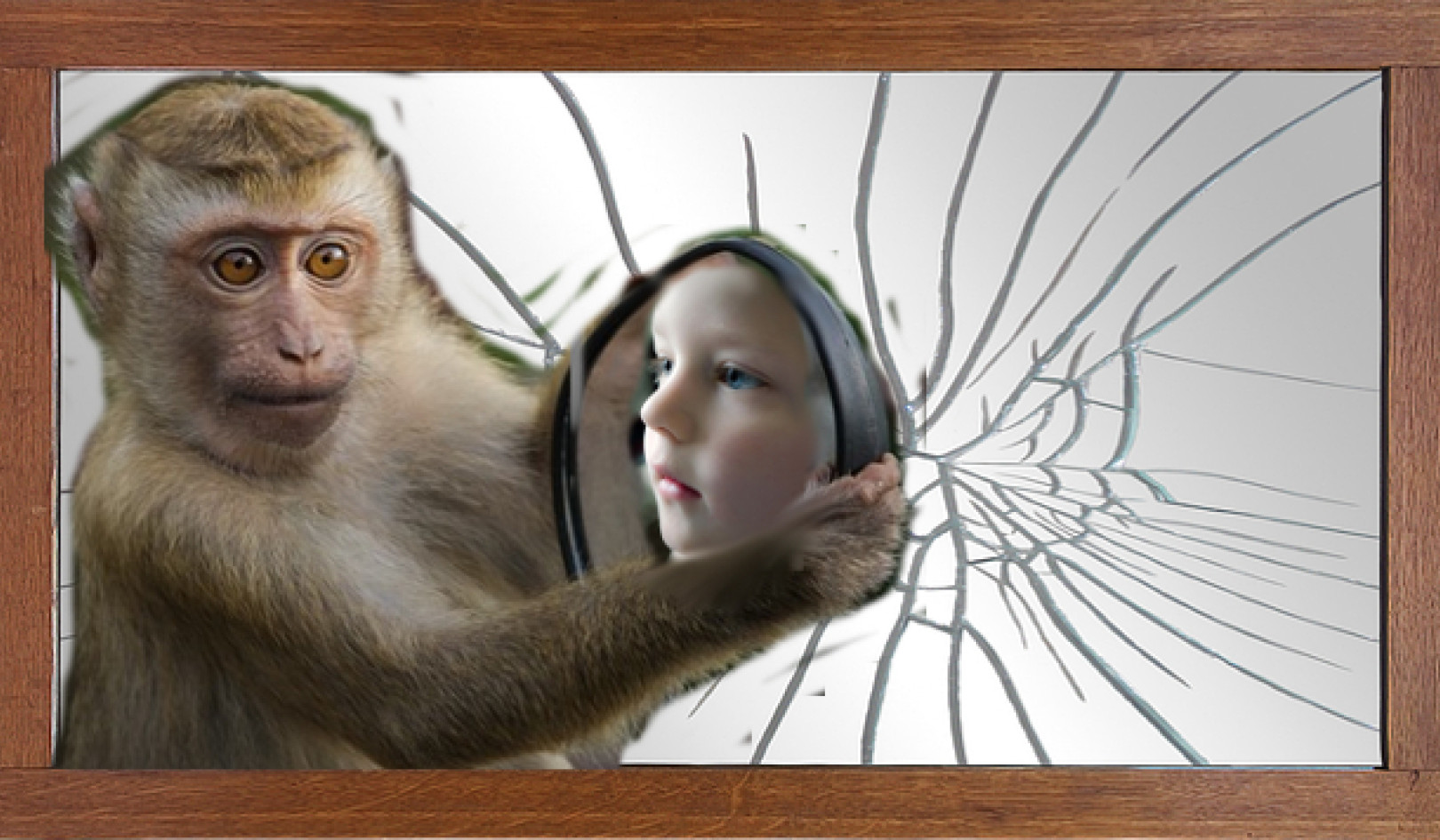
When we started writing this book, we’d envisaged that towards the end it would be a good idea to visit a Buddhist monastery and talk to one or more of the monks about what we had found. ‘We might as well visit a Catholic monastery, don’t you think?’ Catherine suggested. ‘Just to get a balance: we’d have both an Eastern and a Western religious view.’
We chose a Benedictine monastery. Benedictines are known for their simple and austere way of life, which includes seven services of daily contemplation, prayer and singing, beginning at 5am. We met with a monk named Father Nicholas in the Abbey of Quarr, a beautiful red-bricked, Moorish-looking building that you can see as you approach the Isle of Wight by ferry.
As the guest master of this monastery, part of Father Nicholas’s role is to look after visitors who come for retreats. (Hospitality is an important part of the Benedictine tradition, which still follows the rules originally laid down by St Benedict more than 1,500 years ago.) Father Nicholas grew up as an Anglican and entered the Anglican Benedictines in his twenties. Years later he felt something was spiritually missing and he moved into the Catholic Benedictine order at its monastery on the Isle of Wight.
Can Meditation Change You?
We sat down at the guesthouse with Father Nicholas. He offered us tea and told us he’d had meetings with Buddhist monks to discuss the role and value of meditation in religious life.
‘Meditation is only the first step. It’s preparing you for contemplation, where your mind and heart are focused on Christ,’ he told us. ‘Meditation itself cannot change the individual or the world; only if it is a Christ-centered meditation and, even then, only if Christ comes. You can toil the earth, prepare the soil for the plants to grow – but you can’t make the rain come.’
We told Father Nicholas about some of the darker aspects of meditation we had found, how it can unleash deep emotional material, possibly leading to violent or unethical behaviour. Can the same happen with a Christian monk who prays and meditates a number of hours per day?
‘It’s true that sin always exists,’ said Father Nicholas, ‘always, while we’re alive. So if you are in meditation, contemplation or prayer 22 hours a day, there are still two hours where you have to act and are open to sin. But psychological integration is not enough – only God allows you to be in real control of your actions; only God can disperse evil.’
‘What do you mean by evil?’
‘Oh, it’s very un-PC to talk about it these days, but Catholics do believe that evil is real; that angels and demons exist. Psychology and psychiatry don’t explain all our behaviours, do they?’
We smiled at Father Nicholas. I was about to say something when he looked at his watch and jumped up.
‘Oh dear Lord! I have to do the community’s wash up.’
Instant Results with A Buddha Pill?
When I typed up the interview, I was struck to notice that a Benedictine monk had used almost exactly the same words as a Hindu ascetic – Swami Ambikananda had also mentioned that we could meditate for 22 hours a day but that during those two remaining hours all kinds of un-enlightened selfish actions were possible. (It also brought to mind a prisoner I’d met who told me that he had been a Buddhist for years and meditated daily – but was nevertheless in prison for recently committing a violent armed robbery.)
I liked their no-nonsense, pragmatic approach to the spiritual life. Neither of them believes in magical solutions to personal change – rather, they believe it takes persistence, hard work, as well as an element of luck, fortune and, for the Benedictine monk, God’s grace. This realization is at odds with our culture of wanting instant results, which some people hope to get through meditation.
Is Meditation A Buddha Pill?
Is meditation then a Buddha pill? No, it isn’t in the sense that it does not constitute an easy or certain cure for common ailments (if we conceptualize depression as the common cold of the mental health world).
However, yes, in the sense that, like medication, meditation can produce changes in us both physiologically and psychologically, and that it can affect all of us differently. Like swallowing a pill, it can bring about unwanted or unexpected side-effects in some individuals, which may be temporary, or more long-lasting. Some of us might notice feeling different quite quickly; others may need a bigger dosage to bring about the desired effect. Certain individuals may find they feel no different at all; others may suffer quite a strong reaction, possibly an irreversible one. Some may find the effect lasts only for the specific time they are ‘taking the pill’ (that is, the actual 20 minutes, or however long, that they spend in meditation), and then quickly wears off. Others may be surprised to notice themselves feelings more spiritually minded (which is the ‘Buddha’ part of the pill).
Which of these parameters and effects apply to you will depend on your motivation to try out meditation, the time you spend doing it and the guidance you have during your practice.
So if you’re a therapist and your client asks you about using meditation – of any kind – what should you say? I would want to know what my client believes he or she will get from the practice. Is the client looking to feel less stressed, or are aspirations somewhat higher. Perhaps, for example, he or she is expecting a fast-track route to increased insight or better relationships with others?
I’d be more favourably inclined to encourage a client to try meditation if he or she wanted to use it for stress relief than for relational issues. And, as a rule of thumb, it’s probably a good idea to tell your client that there is no guarantee that meditation will have any impact on shifting the cognitive or behavioural patterns that underpin or maintain the difficulties he or she is already having.
Realistically, stories of enduring personal change are far less common than stories of ‘becoming relaxed’ or ‘feeling more centered’. Change, for most of us, is a long, slow and uneven process, very much like a small child’s language development – weeks go by in which a child may utter no new words, but then, suddenly, within a couple of days, he or she speaks a whole sentence. There are no quick fixes when it concerns our inner life.
A Visit To The Vihara
We arrived late for the beginning of the meditation session. Catherine had been stuck in a traffic jam on the way from London. We took our shoes off and walked into the room of the Burmese Buddha Vihara monastery in Oxford to find it was packed. People were sitting cross-legged on the floor on cushions, knee-to-knee, chanting. This was Catherine’s first visit to a Buddhist temple – I noticed her expression of surprise as we entered. She had been expecting a quiet meditation session in a bare room. I motioned to her to sit down next to me and join in with the chanting.
‘A 40-minute meditation followed. After this there was a question-and-answer session with one of the monks, Venerable Dhammasi.
It turned out that Dhammasi was a trustee of the Oxford Mindfulness Centre and was well acquainted with a number of mindfulness researchers – I’d forewarned him about our mindfulness-based therapy questions, so that he could come prepared.
‘Mindfulness is nothing but an introduction to Buddhism; Mark Williams has told me that himself, though he won’t write it in his books. But it’s not enough; eight weeks of mindfulness only touches the surface of what is needed for personal development.’
‘But can these secular mindfulness programmes actually change people?’ I asked.
‘Their purpose is to reduce stress or to prevent relapse of depression. It’s designed to help with a certain issue. Whether or not it transforms them ...’ the monk hesitated for a moment, ‘you’d need to see from research. It’s a beginning, just a beginning. If you read the Buddhist teachings, mindfulness doesn’t come alone, you need the other parts – right thinking, right action ...’
‘Excuse me, can I say something?’ a woman interrupted. ‘Some weeks ago a monk from New Zealand visited this centre and he told us that mindfulness on its own can teach soldiers to kill more effectively; you need to follow the eightfold path of Buddha to live your life in a transformed way.’
‘That’s right,’ Dhammasi said. ‘You can visit the Pentagon website and learn how they’re also using mindfulness with soldiers.’
Catherine raised her eyebrows at me and pointed to one of the questions on our list. ‘Some studies suggest that mindfulness might be more effective on people who are more psychologically vulnerable – for example, those who suffered trauma and abuse at an early age. Do you have any ideas on why that may be?’
‘People are using a manual, a programme and trying to tick all the boxes. Mindfulness is not meant to be used in this way – with a manual; the effect will be limited. The skill and experience of the teacher is the main thing – someone who doesn’t rely on ticking the boxes.’
At the end of the session, after most people had left the room, I went up to and thanked the monk. I couldn’t resist asking one last question: ‘Is an enlightened individual still able to commit imperfect actions?’
Dhammasa smiled at me. ‘You’re asking me about enlightenment, but what is that? It’s just ticking one more box; it’s ideology,’ he stated; then he added, ‘I’m sorry if that’s not the answer you were looking for.’
From Mental Hygiene To Inner Exploration
The monk’s frankness was disarming. We tend to think of meditation as a rocket that will thrust us deep into inner space and, as we move closer to the centre of our own inner universe (our inner sun, if you like), we get enlightened. Once we’re there all is well. But, as the monk said, that’s just a mental category, the ticking of a box of how we think advanced meditators ought to feel and behave.
Increasingly, we’ve been buying into exotic ideas of personal change. This is partly because meditation has been marketed to us very well. Along with yoga, meditation continues to grow in popularity. Once viewed as hippyish, meditation and yoga are now simply ‘hip’.
Greater numbers of people are jumping on this fashionable, money-making bandwagon, with companies finding ever-more ways to create something modern out of something ancient, to seize the imagination of the self-improvement generation. This has led to a flurry of emerging new yoga and meditation trends over the last few years – some good, some bad, some rather wacky.
Why not treat meditation as simple mental hygiene: ‘Think about it, you shower every day and clean your body, but have you ever showered your mind?’ asks Ema Seppälä, the Associate Director of the Center for Compassion and Altruism Research and Education at Stanford University. If we look at meditation in this way, should we not be welcoming it as part of our children’s school day? Shouldn’t good, responsible parents start enforcing daily ‘mind hygiene’ on their kids in the same way they do dental hygiene – brush your teeth for 3 minutes, meditate for 10, then off to bed?
There is something very misleading about this idea: meditation isn’t the same thing as brushing your teeth. If you don’t ever brush your teeth, they’ll rot and fall out. If you don’t ever meditate? Well, your mind is not going to decay or fall out. The mental hygiene view of meditation trivializes this ancient technique, tries to portray it as being like a ‘mental shower’. By ‘hygienizing’ meditation we water it down, limiting its purpose and richness as a tool for deep inner exploration.
Meditation And Yoga Are Not A Panacea
Throughout this book we have aimed to be fully transparent about our own journey in teasing out the facts, about meditation’s ability to propagate personal change, from the fiction.
Meditation and yoga are not a panacea; nevertheless, they can be powerful techniques for exploring the self. Probably more important than the type of practice is the choice of teacher and knowing why you want to put time aside to meditate every day or try out a weekend retreat. Be realistic about what you’re trying to get out of it.
Personality may also play its part. Extraverts will struggle more on silent retreats, while introverts may cringe in yoga classes that ask you to find a partner and assist each other with poses. You may find that the method that is ‘right’ for you is one where you and your instructor have a lot in common, personality-wise.
Can meditation change you? Of course it can. Anything you invest time and effort into is likely to impact you in some way. It’s just that the impact may not necessarily be in the ways you may expect or predict. Meaningful personal change isn’t a destination, it’s a journey; and usually one that is far from linear.
If, like us, you still have hope that contemplative techniques can help you change or explore yourself, don’t forget to stay open to what happens along the way. Each and every practice, the classes we choose to attend, the books we read and especially the people we meet will change us – perhaps more significantly than the technique itself.
Copyright 2015 and 2019 by Miguel Farias and Catherine Wikholm.
Published by Watkins, an imprint of Watkins Media Limited.
All Rights Reserved. www.watkinspublishing.com
Article Source
The Buddha Pill: Can Meditation Change You?
by Dr Miguel Farias and Dr Catherine Wikholm
 In The Buddha Pill, pioneering psychologists Dr Miguel Farias and Catherine Wikholm put meditation and mindfulness under the microscope. Separating fact from fiction, they reveal what scientific research – including their groundbreaking study on yoga and meditation with prisoners – tells us about the benefits and limitations of these techniques for improving our lives. As well as illuminating the potential, the authors argue that these practices may have unexpected consequences, and that peace and happiness may not always be the end result.
In The Buddha Pill, pioneering psychologists Dr Miguel Farias and Catherine Wikholm put meditation and mindfulness under the microscope. Separating fact from fiction, they reveal what scientific research – including their groundbreaking study on yoga and meditation with prisoners – tells us about the benefits and limitations of these techniques for improving our lives. As well as illuminating the potential, the authors argue that these practices may have unexpected consequences, and that peace and happiness may not always be the end result.
Click here for more info and/or to order this paperback book. Also available in a Kindle edition.
About the Authors
 Dr Miguel Farias has pioneered brain research on the pain alleviating effects of spirituality and the psychological benefits of yoga and meditation. He was educated in Macao, Lisbon and Oxford. Following his doctorate, he was a researcher at the Oxford Centre for the Science of Mind and a lecturer at the Department of Experimental Psychology, University of Oxford. He currently leads the Brain, Belief and Behaviour group at the Centre for Research in Psychology, Behaviour and Achievement, Coventry University. Find out more about him at: http://miguelfarias.co.uk/
Dr Miguel Farias has pioneered brain research on the pain alleviating effects of spirituality and the psychological benefits of yoga and meditation. He was educated in Macao, Lisbon and Oxford. Following his doctorate, he was a researcher at the Oxford Centre for the Science of Mind and a lecturer at the Department of Experimental Psychology, University of Oxford. He currently leads the Brain, Belief and Behaviour group at the Centre for Research in Psychology, Behaviour and Achievement, Coventry University. Find out more about him at: http://miguelfarias.co.uk/
 Catherine Wikholm read Philosophy and Theology at Oxford University before going on to do a Masters in Forensic Psychology. Her strong interest in personal change and prisoner rehabilitation led her to be employed by HM Prison Service, where she worked with young offenders. She has since been working in NHS mental health services and is currently completing a practitioner doctorate in Clinical Psychology at the University of Surrey. Miguel and Catherine worked together on a ground-breaking research study investigating the psychological effects of yoga and meditation in prisoners. Find out more at www.catherinewikholm.com
Catherine Wikholm read Philosophy and Theology at Oxford University before going on to do a Masters in Forensic Psychology. Her strong interest in personal change and prisoner rehabilitation led her to be employed by HM Prison Service, where she worked with young offenders. She has since been working in NHS mental health services and is currently completing a practitioner doctorate in Clinical Psychology at the University of Surrey. Miguel and Catherine worked together on a ground-breaking research study investigating the psychological effects of yoga and meditation in prisoners. Find out more at www.catherinewikholm.com
Related Books
at InnerSelf Market and Amazon
























